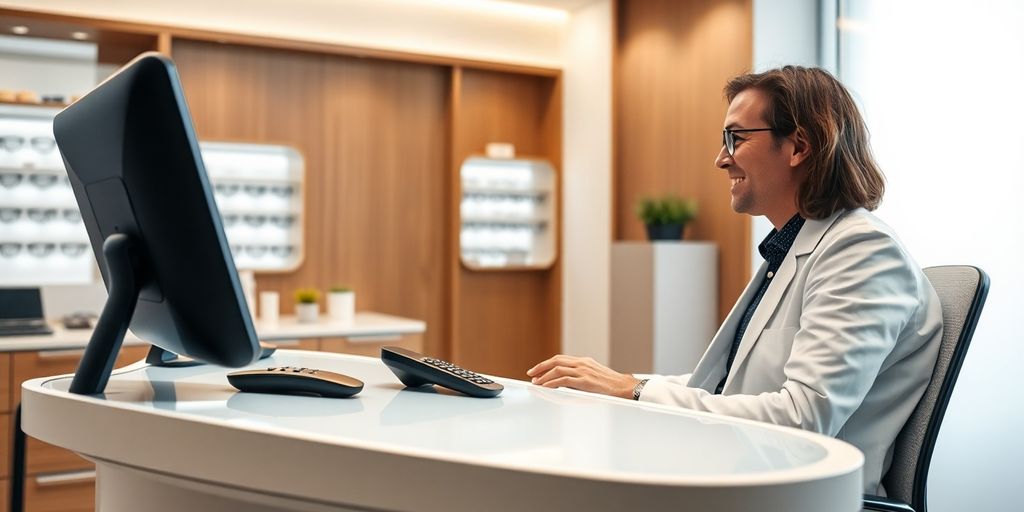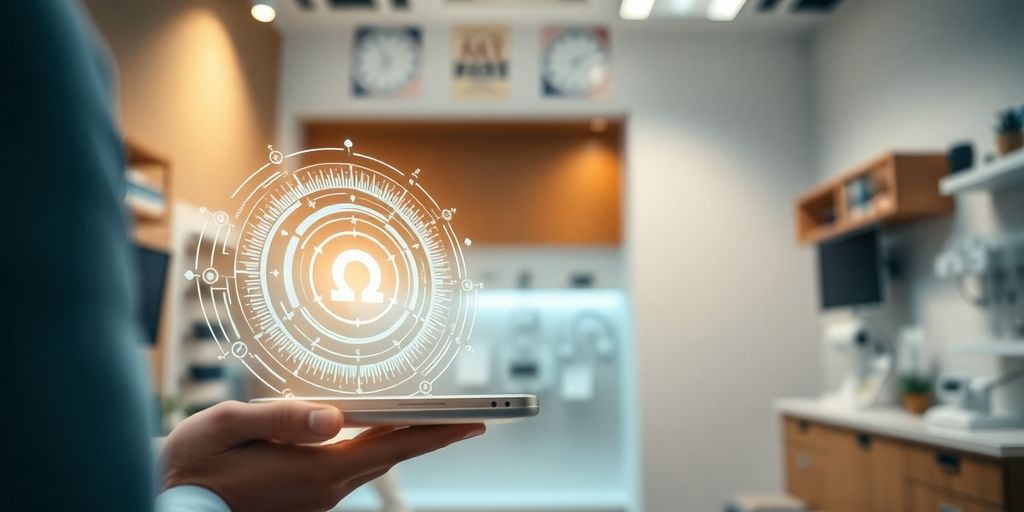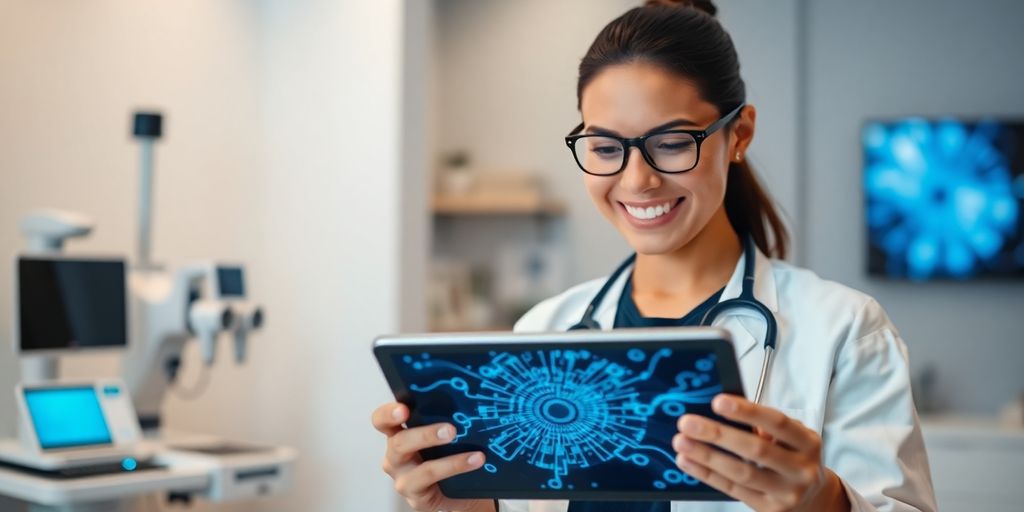Running an optometry practice means juggling a lot of things. You've got patient care, staff management, and all the administrative stuff that comes with it. It can get pretty overwhelming, right? Well, imagine if you could automate some of those time-consuming tasks, especially when it comes to patient calls. That's where an ai phone answering system for optometrist comes in. It's not some futuristic gadget; it's a practical tool that can really make a difference in how your practice runs day-to-day.

Let's talk about how AI can really make a difference in how you connect with the people who come to your practice. It's not just about answering phones; it's about making sure every patient feels heard and looked after, even when your staff is busy.
Think about reaching out to patients proactively. AI can help send out messages about new services or important practice updates. It’s a way to keep everyone informed without your team having to manually send out hundreds of emails or texts. This kind of consistent communication helps build a stronger relationship with your patient base. You can even use it to follow up after appointments, asking how things are going or reminding them about their next check-up. It’s about being present for your patients, even when they’re not in the office. This can really help with patient retention.
No-shows can really disrupt a day, right? AI systems can handle sending out appointment reminders automatically. These aren't just generic texts; they can be personalized, reminding patients of their specific appointment time and date. Some systems can even send reminders via text or voice call, giving patients options. If a patient needs to reschedule, the AI can often handle that too, offering available slots. This reduces the number of calls your front desk has to make, freeing them up for other tasks. It’s a simple change that cuts down on missed appointments significantly.
People appreciate it when you remember the little things. AI can help you send messages that feel personal. For example, after an eye exam, the AI could send a follow-up message with tips related to the patient's specific eye health needs, or perhaps information about new frame styles that match their previous purchases. It’s about tailoring the communication to the individual. This level of personalization shows you care about their well-being beyond just the appointment itself. It makes patients feel more valued and understood.
Using AI for patient communication isn't about replacing the human touch; it's about augmenting it. It allows your staff to focus on more complex patient needs and direct interactions, while the AI handles the repetitive, yet important, communication tasks.

Running an optometry practice means juggling a lot of moving parts, and sometimes, the day-to-day operations can really bog down your team. That's where an AI phone answering system can step in and make a real difference. Think about all those routine calls that eat up valuable staff time – appointment confirmations, basic questions about hours, or even directing calls. An AI system can handle a good chunk of these, freeing up your receptionists and support staff to focus on patients who are actually in the office or need more complex assistance. This shift allows your team to concentrate on higher-value tasks, improving overall job satisfaction and patient care.
AI can take over repetitive administrative duties that often fall to your staff. This includes things like answering frequently asked questions, verifying insurance information before an appointment, or even guiding patients through simple pre-appointment instructions. By automating these, you reduce the chance of human error and ensure consistent information delivery every time. It’s like having an extra, always-available team member who never gets tired of answering the same question for the tenth time.
When your staff isn't bogged down with basic phone inquiries, they can be more productive. They can spend more time with patients, handle more complex patient needs, or even assist with other practice management tasks. Imagine your front desk staff being able to fully focus on greeting patients, managing check-ins, and addressing immediate patient concerns without the constant interruption of the phone. This leads to a smoother patient flow and a more positive experience for everyone involved. It’s about making sure your skilled professionals are using their time wisely, not on tasks an AI can manage.
The administrative load in a medical practice can be immense. From managing call logs to routing inquiries, it all adds up. An AI phone system can significantly lighten this load. It can categorize calls, take messages accurately, and even schedule follow-ups based on predefined rules. This means less paperwork, fewer missed messages, and a more organized system for managing incoming communications. For practices looking to streamline operations, integrating such a system can be a game-changer, helping to avoid common management errors and keep things running smoothly. You can find more information on keeping your practice running well at avoiding common errors.
The goal here isn't to replace your human staff, but to augment their capabilities. By offloading the predictable and repetitive, you allow your team to focus on the human element of care – empathy, complex problem-solving, and building patient relationships. This makes the entire practice more efficient and, frankly, a better place to work and receive care.
Even when your practice doors are closed, patient needs don't take a break. An AI phone answering system keeps your practice accessible 24/7, handling calls during off-hours, holidays, and weekends. This means no more missed opportunities or frustrated patients trying to reach you after hours. The system can manage routine inquiries, schedule appointments, and even provide basic information, acting as a consistent point of contact.
An AI system can automatically switch to after-hours protocols when your office closes. It can answer frequently asked questions, direct urgent calls to an on-call provider if needed, or take messages for follow-up the next business day. This keeps patient information flowing and ensures that critical needs are addressed promptly.
Holidays can be particularly challenging for patient access. AI can manage calls during these times, informing callers of your holiday hours, taking messages, or scheduling appointments for when you reopen. This prevents a backlog of calls and ensures patients feel supported even when staff are off.
Patients expect reliable service, regardless of the time or day. AI provides this consistency, offering a professional and helpful interaction every time someone calls. This reliable support builds patient trust and satisfaction, contributing to better retention. It acts as an extension of your practice, maintaining a high standard of care even when your team isn't physically present. You can even get a deep dive analysis of missed calls to identify opportunities for improvement [e529].
When dealing with patient information, keeping things private is a big deal. Our AI phone system takes this seriously. Every single call is encrypted from start to finish, meaning the conversation between the patient and the AI is scrambled and unreadable to anyone who might try to intercept it. This isn't just a nice-to-have; it's about protecting sensitive health details. Think of it like sending a sealed letter instead of a postcard – only the intended recipient can read what's inside. This level of security helps build trust with your patients, showing them you prioritize their privacy.
Beyond just the calls themselves, how the AI system handles patient data is also super important. We make sure that any information gathered during a call, like appointment details or basic patient queries, is stored securely. This means it's protected from unauthorized access, both while it's being processed and when it's stored. We follow strict protocols to keep this data safe, so you don't have to worry about breaches or accidental leaks. It’s all about responsible data management, making sure patient information stays where it belongs – with you and your practice.
Navigating healthcare regulations can feel like a maze, especially when it comes to patient privacy. HIPAA compliance is a major part of that. Our AI phone answering system is built with these rules in mind from the ground up. We've designed it to help you meet those requirements without adding extra work to your plate. By using end-to-end encryption and secure data handling practices, the system helps you avoid common compliance pitfalls. This means you can focus more on patient care and less on the technicalities of data security. It’s about having peace of mind knowing your communication tools are working to keep you compliant, not against you. You can learn more about how AI can help manage your practice by checking out AI Front Desk.
Managing on-call schedules for your optometry practice can feel like a constant juggling act. Spreadsheets get outdated fast, and keeping everyone informed about who's covering when is a headache. That's where AI steps in. It can really simplify this whole process.
Forget those endless email chains and confusing shared documents. AI systems can take over the heavy lifting of scheduling. You can often use a simple drag-and-drop interface to build your on-call calendar. This makes it way easier to see who's on duty and when. It’s a big change from trying to track everything manually.
What's really neat is how AI can keep your schedule current automatically. If someone needs to swap a shift or an emergency comes up, the AI can update the calendar instantly. This means everyone sees the most up-to-date information, reducing confusion and missed calls. It’s like having a dedicated scheduler working for you 24/7.
Beyond just updating the calendar, AI can also proactively alert your staff. It can send out notifications when a new schedule is posted, when changes are made, or even remind staff members of their upcoming shifts. This kind of heads-up helps prevent no-shows and ensures your practice always has the right coverage. It’s a smart way to keep your team on the same page and ready to go. You can even integrate these systems with your existing practice management software for a more connected workflow, which can really help with centralizing appointment scheduling.

Think about how much time your front desk staff spends just trying to get appointments booked and managed. When your AI phone system talks directly to your practice management software, it’s like having an extra pair of hands that never gets tired. The AI can check availability in real-time, book new appointments, and even reschedule existing ones without anyone needing to pick up the phone or manually enter data. This means fewer errors and a much smoother process for everyone involved. It really helps keep the schedule looking neat and tidy.
Keeping patient records up-to-date is a big job. An integrated AI system can automatically pull information from calls – like a new patient’s contact details or a returning patient’s reason for calling – and put it right into the patient’s file in your practice management system. This reduces the need for manual data entry, saving your staff valuable time and cutting down on mistakes. Imagine not having to re-enter information that the AI already captured. It’s a game-changer for keeping patient data accurate and accessible. You can get more details about how these systems work by looking at virtual AI receptionist applications.
When your AI phone system and practice management software work together, the whole practice runs better. Staff aren't bogged down with repetitive phone tasks, so they can focus on patients who are in the office or handle more complex issues. This connection means less time spent on administrative work and more time for patient care and practice growth. It’s about making sure the technology you invest in actually makes your day-to-day operations more efficient. For example, systems like My AI Front Desk are designed to connect with your existing tools to make this happen.
Integrating your AI phone answering system with your existing practice management software isn't just a nice-to-have; it's becoming a necessity for practices that want to stay competitive and efficient. It creates a connected ecosystem where information flows freely, reducing manual work and freeing up your team to do what they do best: care for patients.

Think about the last time you had a really good experience with a business. Chances are, it felt easy, personal, and like they actually cared about you. That's exactly what an AI phone answering system can do for your optometry practice. It's not just about answering calls; it's about making every patient feel seen and valued, from their very first contact.
AI can help you connect with patients in ways that feel natural and helpful. Instead of just a generic greeting, AI can pull up patient information and greet them by name, maybe even referencing their last visit or upcoming needs. This kind of personal touch makes a big difference. It shows you're not just another number; you're an individual with specific eye care needs.
We all know how frustrating it is to be put on hold or to wait for a callback. AI can change that. It can handle common questions instantly, like office hours, directions, or even basic pre-appointment instructions. For more complex issues, it can gather necessary information and route the call to the right person, reducing wait times and getting patients the help they need faster. This immediate responsiveness is a game-changer for patient satisfaction.
Happy patients come back. When your practice uses AI to provide consistent, helpful, and personalized communication, it builds trust and loyalty. Automated follow-ups after appointments, reminders for check-ups, and even personalized eye care tips can keep your practice top-of-mind. It's about creating a positive ongoing relationship, not just a single transaction. This consistent, positive interaction is key to keeping patients coming back year after year.
Managing your team effectively is a big part of running a smooth optometry practice. When your staff is on the same page and knows what they need to do, everything just works better. Think about it: less confusion means more time for patients.
Having one place where everyone can get information cuts down on missed messages and misunderstandings. Instead of scattered emails or texts, a good system acts like a central hub. This means everyone sees the same updates, whether it's a schedule change or a new patient protocol. This kind of clarity really helps prevent those little errors that can add up.
Sharing patient details or practice updates shouldn't be a chore. With the right tools, like an AI system that integrates with your practice management software, information flows easily. Staff can quickly access what they need without digging through old files or asking multiple people. This makes things like preparing for a patient's visit much quicker.
When routine tasks are handled by AI, like answering common questions or confirming appointments, your team is freed up. They can spend more time on what really matters: direct patient care, complex problem-solving, and building relationships with patients. It’s about letting your staff do the jobs they were trained for, not getting bogged down in administrative busywork.
Picking the right AI phone answering system for your optometry practice can feel like a big decision. You want something that works well, doesn't cause headaches, and actually helps your patients and staff. It’s not just about getting a cheaper phone service; it’s about finding a partner that understands your practice.
When you're looking at different companies, think about what they actually do. Do they just answer phones, or do they have other services that could help? Some might offer help with scheduling, sending out appointment reminders, or even handling basic patient questions. It’s good to see if they have different plans or packages, too. Maybe you only need basic call answering now, but could use more features later. Also, check out their customer support – how easy is it to get help if something goes wrong? A vendor that’s easy to work with makes a big difference.
What are the absolute must-haves for your practice? You’ll want to think about things like HIPAA compliance – that’s non-negotiable. Does the system encrypt calls and handle patient data securely? Another big one is how well it can handle your specific needs. Can it manage after-hours calls or holiday coverage without missing a beat? Look for systems that can automate routine tasks, like sending out appointment reminders, so your staff can focus on patients in the office. If you need Spanish-speaking agents, make sure that’s an option. It’s also smart to see if the system can integrate with your current practice management software. That way, everything stays connected and you don’t have to enter information twice.
Every practice is a little different, right? So, what works for one might not be perfect for another. Think about the size of your practice and how many calls you get. Do you have a lot of patients who call after hours? Do your staff often get bogged down with simple questions that an AI could handle? It’s also worth considering your budget. Some systems might have a higher upfront cost but save you money in the long run by reducing staff time spent on the phone. You might even want to ask for a demo or a trial period to see how the system actually performs in your day-to-day operations before committing. Getting feedback from your staff during this process is a good idea too; they’re the ones who will be using it most directly.
An AI phone answering system can really change how potential patients first interact with your practice. Think about it: when someone calls your office, they want answers, and they want them fast. If they get sent to voicemail or have to wait on hold forever, they might just hang up and try the next optometrist on the list. An AI system, though, can pick up every call, 24/7. It can answer common questions about services, office hours, or even help them book their first appointment. This immediate, helpful response makes a great first impression. It shows you're a modern practice that values a patient's time. Plus, by handling these initial inquiries efficiently, your front desk staff are freed up to focus on patients who are already in the office, making their experience better too.
Keeping the patients you already have is just as important as getting new ones, right? An AI phone system helps with this by making communication easier and more consistent. Automated appointment reminders are a big one – they cut down on no-shows significantly. But it goes beyond just reminders. The AI can also handle follow-up calls after appointments, check in on patients who might have missed a visit, or even send out personalized messages about eye health tips or new services relevant to them. When patients feel like they're being looked after, even when they're not in the chair, they're more likely to stick around. It builds loyalty.
So, how does all this translate to more money for your practice? It's pretty straightforward. By attracting more new patients and keeping your current ones happy and engaged, you naturally increase appointment volume. Fewer missed appointments mean less lost revenue. More efficient operations, thanks to the AI handling routine calls and tasks, mean your staff can see more patients or spend more time on complex patient needs, rather than getting bogged down by administrative work. Think of the AI as a tireless employee that never takes a break and handles the basic stuff so your human team can focus on what they do best – providing excellent eye care. This improved efficiency and patient engagement directly contributes to a healthier bottom line.
Want to make your practice grow faster? Using AI for your business can really help. Imagine having a smart assistant that handles calls and appointments, so you can focus on your patients. It's like having a super helpful receptionist who's always there. Want to see how it works?
So, we've talked a lot about how AI phone systems can really help out your optometry practice. It’s not just about answering calls when you can't; it’s about making things smoother for your staff and better for your patients. Think about it – fewer missed appointments, less time spent on hold, and your team can focus on what they do best, which is taking care of eyes. It might seem like a big change, but getting an AI system in place can really free up your day and help your practice run a lot better. It’s a smart move for keeping things organized and patients happy.
Think of an AI phone system like a super-smart helper for your office. It can answer common questions, set up appointments, and even remind patients about their visits. This frees up your staff to focus on helping patients in person.
Yes, absolutely! These systems are built with patient privacy in mind. They use special coding to keep all conversations and patient details safe and sound, following important rules like HIPAA.
It's like having someone available 24/7! Even when your office is closed, the AI can handle calls, answer questions, and make sure patients get the help they need, whether it's a holiday or late at night.
Definitely. Instead of manually calling or texting everyone, the AI can send out appointment reminders automatically. It can also send personalized messages, like follow-ups after an eye exam or special offers.
AI can take over many of the repetitive tasks, like answering frequently asked questions or scheduling basic appointments. This means your team can spend more time on important things like patient care and complex issues.
Many AI phone systems can connect with your existing office software. This means appointment information can be shared instantly, reducing the chance of mistakes and making everything run more smoothly.
When choosing a system, look for one that's easy to use and has features that fit your practice's specific needs. Think about how well it handles appointments, reminders, and patient communication.
By handling calls, sending reminders, and managing schedules more efficiently, an AI system can help your practice run better. This can lead to happier patients who keep coming back, and attract new patients too.
Start your free trial for My AI Front Desk today, it takes minutes to setup!








